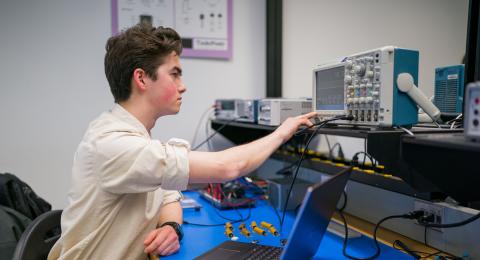

This program is tailored to students who want to understand and participate in the engineering discipline that merges electronics systems with software. Students learn the fundamental concepts of electrical circuits and how those circuits can be controlled by software, gaining skills and technological expertise needed to succeed in graduate studies or a variety of career fields.
You’ll work in a hands-on laboratory environment that reinforces traditional classroom learning while providing the real-world skills valued by employers. Seniors choose from a suite of professional technical electives and carry out a capstone design project tailored to their career objectives. You can complete an accelerated master’s program, participate on competitive teams at national competitions and gain hands-on experience at the UNH InterOperability Lab, where you’ll work alongside top tech companies to test their networking equipment before it hits the market. This program has a high placement rate because of its great reputation among industry employers.


Wesley Newsam discusses his favorite things about attending the University of New Hampshire as a chemical engineering student and advice for those considering UNH.
This program is tailored to students who want to understand and participate in the engineering discipline that merges electronics systems with software. Students learn the fundamental concepts of electrical circuits and how those circuits can be controlled by software, gaining skills and technological expertise needed to succeed in graduate studies or a variety of career fields.
In addition to the university's mandatory Discovery Program requirements, degree candidates must complete our core program (freshman through junior years). In the senior year, students select professional technical electives in the areas of their interest. They also carry out a student-designed project to acquire both breadth and depth of study and to integrate knowledge across course boundaries.
The Computer Engineering (B Sci in Computer Engineering) program is accredited by the Engineering Accreditation Commission of ABET, https://www.abet.org , under the General Criteria and the Program Criteria for Electrical, Computer, Communications, Telecommunication(s) and Similarly Named Engineering Programs.
Degree Plan| First Year | ||
|---|---|---|
| Fall | Credits | |
| ECE 401 | Perspectives in Electrical and Computer Engineering | 4 |
| CS 410C | Introduction to Scientific Programming/C | 4 |
| MATH 425 | Calculus I | 4 |
| ECON 402 | ||
Students are required to take either ECON 402 Principles of Economics (Micro) or EREC 411 Environmental and Resource Economics Perspectives to fulfill the Social Science Category of the Discovery Program.
Four professional electives must be selected as follows:
ECE 791 Senior Project I and ECE 792 Senior Project II fulfill Discovery Program Capstone Experience.
Fulfilling the CE program curriculum taking ECE 401 Perspectives in Electrical and Computer Engineering , ECE 791 Senior Project I , and ECE 792 Senior Project II will automatically meet Discovery Category, "Environment, Technology and Society."
Requirements for the ProgramAll Major, Option and Elective Requirements as indicated.
*Major GPA requirements as indicated.
In addition to Discovery Program requirements, the department has a number of grade-point average and course requirements:
To make an exception to any of these departmental requirements based on extenuating circumstances, students must petition the department's undergraduate committee. Mindful of these rules, students, with their adviser's assistance, should plan their programs based on the distribution of courses found in the Degree Plan tab.
| Code | Title | Credits |
|---|---|---|
| Required Courses | ||
| CS 410C | Introduction to Scientific Programming/C | 4 |
| CS 419 | Computer Science for Engineers and Scientists | 4 |
| ECE 401 | Perspectives in Electrical and Computer Engineering | 4 |
| ECE 541 | Electric Circuits | 4 |
| ECE 543 | Introduction to Digital Systems | 4 |
| ECE 548 | Electronic Design I | 4 |
| ECE 562 | Computer Organization | 4 |
| ECE 583 | Designing with Programmable Logic | 6 |
| ECE 602 | Engineering Analysis | 3 |
| ECE 603 | Electromagnetic Fields and Waves I | 3 |
| ECE 633 | Signals and Systems I | 3 |
| ECE 634 | Signals and Systems II | 3 |
| ECE 647 | Random Processes and Signals in Engineering | 3 |
| ECE 649 | Embedded Microcomputer Based Design | 6 |
| ECON 402 | Principles of Economics (Micro) | 4 |
| or EREC 411 | Environmental and Resource Economics Perspectives | |
| MATH 425 | Calculus I | 4 |
| MATH 426 | Calculus II | 4 |
| MATH 527 | Differential Equations with Linear Algebra | 4 |
| MATH 645 | Linear Algebra for Applications | 4 |
| PHYS 407 | General Physics I | 4 |
| PHYS 408 | General Physics II | 4 |
| Capstone 2 | ||
| ECE 791 | Senior Project I | 3 |
| ECE 792 | Senior Project II | 3 |
| Professional Electives | ||
| Choose four professional elective courses 1 | 16 | |
| Other Courses | ||
| Discovery requirements not already covered by required courses 2 | 24 | |
| Total Credits | 129 | |
Four professional electives must be selected as follows:
Fulfilling the CE Program curriculum taking ECE 401 Perspectives in Electrical and Computer Engineering , ECE 791 Senior Project I , and ECE 792 Senior Project II curriculum will automatically meet Discovery Category, "Environment, Technology and Society."
Student Learning OutcomesThe Department of Electrical and Computer Engineering has adopted a set of student outcomes that consists of statements describing what students are expected to know and be able to do by the time of graduation, the achievement of which indicates that the student is equipped to achieve the program objectives.
The current student outcomes are: